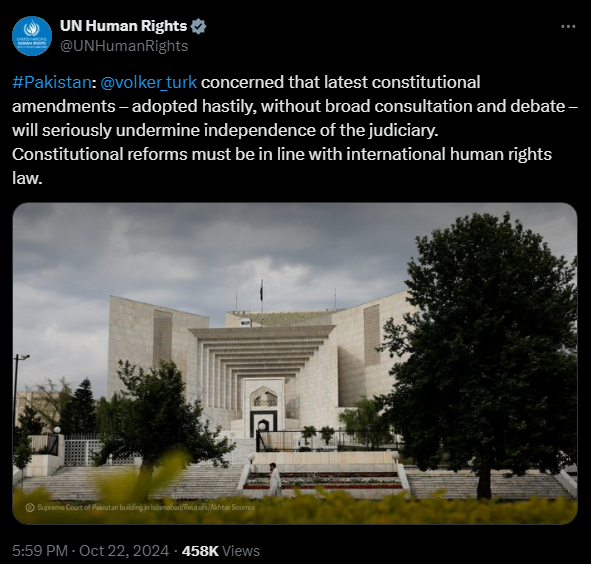'Hastily' passed 26th Amendment to undermine judicial freedom: UN rights chief
Human Rights watchdog Volker Turk says amendments were "adopted hastily and without broad consultation and debate"
United Nations Human Rights chief Volker Turk has expressed concern that the "hastily adopted" 26th Constitutional Amendment would undermine the independence of the judiciary.
The UN rights chief’s remarks came days after the coalition government managed to pass the contentious 26th Constitutional Amendment bill, empowering the country’s parliament to pick the next Chief Justice of Pakistan (CJP).
In a post on X (formerly Twitter), Turk said that the amendments were “adopted hastily and without broad consultation and debate”.
“Constitutional reforms must be in line with international human rights law,” the statement added.
The passage of the contentious package drew strong criticism from the opposition and lawyers community, with Pakistan Tehreek-e-Insaf (PTI) vowing to launch a protest movement across the country.
The Human Rights Commission of Pakistan (HRCP) has also expressed strong reservations over certain aspects of the amendments.
The amendments brought numerous changes to the country’s judicial system, including taking away suo motu powers, formation of constitutional benches, and performance evaluations of high court judges.
In light of the fresh amendments, a Special Parliamentary Committee nominated Justice Yahya Afridi as the next chief justice of Pakistan (CJP).
After nomination, President Asif Ali Zardari appointed Justice Afridi under clause 3 of Article 175A read with Articles 177 and 179 of the Constitution, according to a notification issued by the Ministry of Law and Justice today.
It stated that the president was pleased to appoint Justice Afridi as the next chief justice “for a term of three years with effect from” October 26.
Highlights of the bill
- Chief Justice of Pakistan's (CJP) tenure fixed at three years.
- Constitutional benches to be established at the SC and high courts.
- Senior-most judge of each bench to serve as presiding officer.
- Parliamentary committee to nominate new CJP from panel of three most senior judges.
- Committee to propose name to PM, who will then forward it to president for final approval.
- JCP, led by CJP and three others, responsible for appointment of SC judges.
- JCP to monitor judges’ performance, report any concerns to Supreme Judicial Council.
- Complete eradication of Riba (interest) from country by January 1, 2028.
-
Security forces gun down 30 terrorists in multiple IBOs in KP: ISPR
-
MQM-P calls for new province in Sindh
-
US report validates Pakistan military edge over India: PM
-
Banned TTP poses serious threat to Pakistan security: UNSC panel
-
CM Afridi clarifies remarks on by-poll after ECP requests army deployment
-
Dubai sees 3.2m Pakistani passengers in 2025 as airport sets new milestone
-
Security forces kill 23 Indian proxy terrorists in KP's Kurram
-
Pakistan to construct island to boost oil exploration: report













